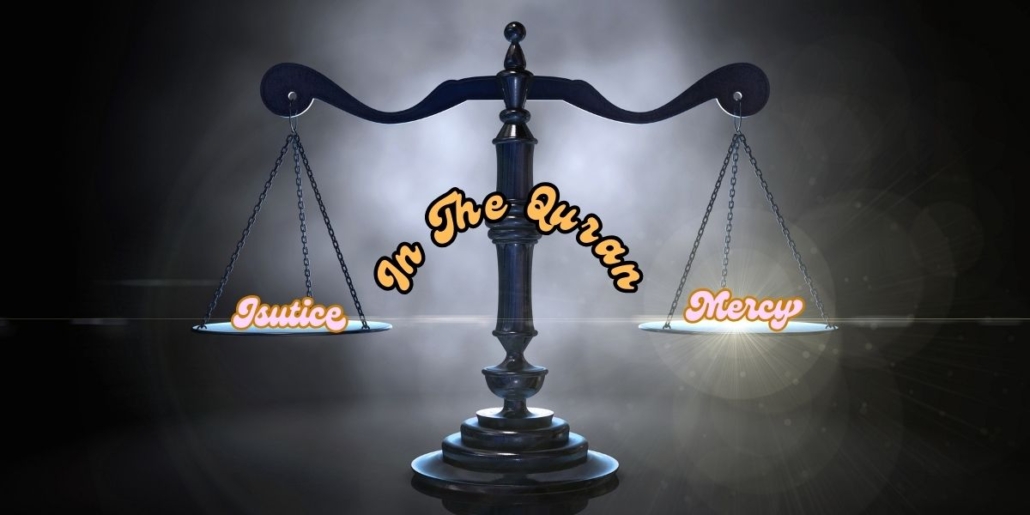The Quran, the sacred text of Islam, is revered not only for its divine guidance but also for the profound way it addresses essential aspects of human life. Among the most significant themes in the Quran are justice and mercy, two attributes that reflect the nature of Allah (God). These concepts are intricately woven throughout the Quranic text, providing Muslims with a comprehensive understanding of how to live justly while also embracing Allah’s mercy. This article explores these themes and their significance in the Quran.
The Concept of Justice in the Quran
Justice is one of the most fundamental principles in Islam, and it is emphasized repeatedly in the Quran. Allah commands that justice be upheld in all aspects of life, from personal interactions to governance. The Quranic approach to justice is comprehensive and fair, urging humans to treat others with equity, regardless of their social status, wealth, or race.
Key Verses on Justice
Surah An-Nisa (4:58):
“Indeed, Allah commands you to render trust to whom they are due and when you judge between people to judge with justice.”
This verse emphasizes that judges and rulers must act justly, ensuring that decisions are made fairly and equitably.
Surah Al-Baqarah (2:286):
“Allah does not burden a soul beyond that it can bear.”
This verse speaks to the fairness of Allah’s justice, highlighting that people are only held accountable for what they can reasonably handle.
Surah Al-Hadid (57:25):
“We sent aforetime our messengers with clear signs and sent down with them the Book and the Balance that the people may stand forth in justice.”
Justice, according to this verse, is not only about personal actions but also about societal structures that ensure fairness.
The Concept of Mercy in the Quran
While justice is essential, the Quran also underscores the importance of mercy, an attribute that is deeply connected to Allah’s essence. Mercy in Islam is seen as a way to balance justice, offering forgiveness and compassion even when strict justice might dictate punishment.
Key Verses on Mercy
Surah Al-A’raf (7:156):
“And My Mercy encompasses all things.”
This verse reminds believers that Allah’s mercy is all-encompassing, touching every aspect of creation and human life.
Surah At-Tawbah (9:128):
“There has certainly come to you a Messenger from among yourselves. Grievous to him is your suffering, anxious to protect you; to the believers is he most kind and merciful.”
Here, the mercy of the Prophet Muhammad (PBUH) towards his followers mirrors the divine mercy granted by Allah.
Surah Ar-Rahman (55:13):
“So which of the favours of your Lord would you deny?”
This verse is a reminder of Allah’s continuous mercy, which is extended to all of creation in countless ways.
Balancing Justice and Mercy
In Islam, justice and mercy are not mutually exclusive but are complementary. While justice ensures that wrongdoers are held accountable, mercy allows for repentance and forgiveness. This balance is crucial for creating a just society that does not lose sight of compassion.
Mercy Over Justice
At times, the Quran encourages believers to prioritize mercy over strict justice, especially when dealing with others’ faults or shortcomings. This reflects Allah’s broader mercy, which is always available to those who seek forgiveness and strive to improve themselves.
Surah Al-Imran (3:134):
“Those who spend in the cause of Allah, in times of ease and in times of hardship, who restrain their anger and who pardon people Allah loves the doers of good.”
This verse highlights the virtue of pardoning others, demonstrating that mercy is a quality beloved by Allah.
Surah Al-Ahqaf (46:16):
“As for those who believe and do righteous deeds, we will admit them to Paradise… where they will not taste death except the first death.”
In this verse, mercy plays a crucial role in Allah’s reward system, emphasizing the importance of divine grace over the strict application of justice.
Mercy and Justice in the Hereafter
The Quran also speaks of the balance of justice and mercy in the afterlife. On the Day of Judgment, every soul will be judged according to their deeds, but Allah’s mercy will extend to those who have sincerely repented and sought forgiveness.
Surah Al-Furqan (25:70):
“Except for those who repent, believe and do righteous work. For them, Allah will replace their evil deeds with good. And ever is Allah Forgiving and Merciful.”
This verse illustrates the transformative power of repentance and how Allah’s mercy can forgive past wrongs.
Key Takeaways:
- Justice in the Quran is comprehensive and calls for fairness in all aspects of life.
- Mercy is an essential attribute of Allah, emphasizing forgiveness and compassion.
- Islam encourages balancing justice with mercy, particularly in dealing with others’ faults and in seeking divine forgiveness.
- The Day of Judgment will reflect both Allah’s justice and mercy, offering hope for those who seek repentance.
Conclusion
The Quran presents a balanced approach to justice and mercy, both of which are central to understanding divine law and the ethical framework of Islam. While justice ensures fairness and accountability, mercy offers hope, forgiveness, and the chance for redemption. This dual emphasis on justice and mercy forms the backbone of Islamic teachings, offering a profound framework for Muslims to navigate the complexities of life with fairness and compassion.
